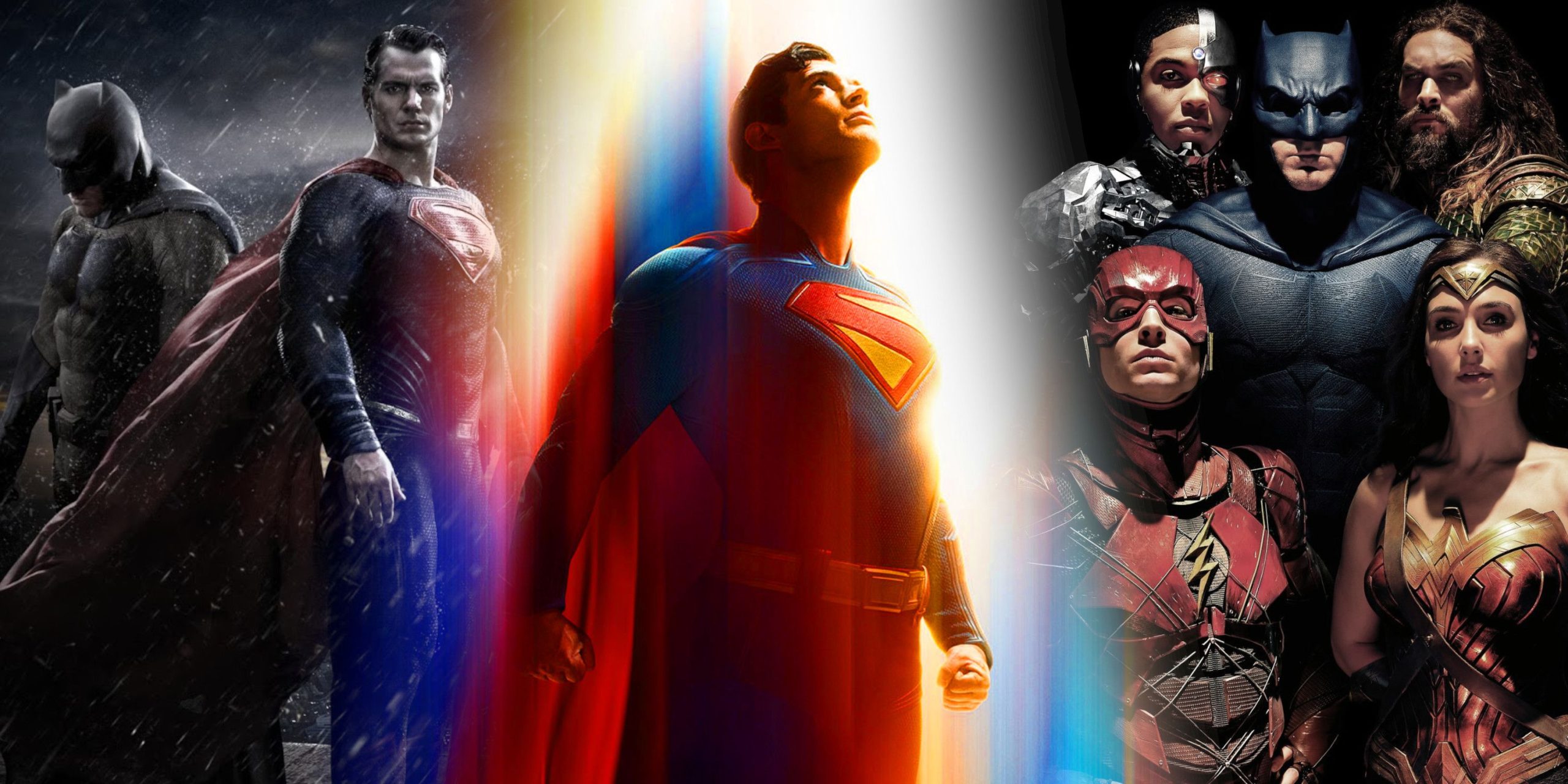[[{“value”:”
Quick Links
DC’s first attempt at a live-action cinematic universe, the DC Extended Universe, was unsuccessful. It certainly had its fans, and I enjoyed some of the films that fell under the DCEU banner, but on the whole, it was messy and inconsistent. It spent its decade-long duration scrambling to catch up with the Marvel Cinematic Universe, and it died before it had a chance to do so. In October 2022, fresh off the heels of Black Adam‘s failure, Warner Bros. Discovery announced that James Gunn and Peter Safran would be taking charge of DC film and television moving forward. 2023’s Aquaman and the Lost Kingdom officially marked the end of the DCEU, and the more simply named DC Universe took its place. Gunn and Safran did away with nearly all the DECU’s cast members and storylines; only a few elements from The Suicide Squad, Peacemaker, and Blue Beetlehave carried over into the DCU.
The DCU technically began with the animated series Creature Commandos, but Gunn’s upcoming Superman film will be the true testing ground for the new cinematic universe. Much of the DCU’s future depends on the success of its first theatrical release, as Gunn himself has acknowledged. There are plenty of reasons to be optimistic about DC’s second attempt at a cinematic universe: Gunn has a proven track record of directing successful superhero films, Creature Commandos has reviewed well thus far, and promotional material for Superman looks promising. Yet there is also cause for concern. As I watched the recently released teaser trailer for Gunn’s take on the Last Son of Krypton, I could not ignore a creeping worry in the back of my mind. It seems that the DCU may already be repeating an early misstep that contributed to the downfall of the DCEU.
The DCU Has a Wide Array of Heroes and Villains
Superman is far from the only prominent figure in the DCU. The upcoming film is set to introduce Krypto the Superdog, Lex Luthor, Green Lantern, Hawkgirl, Metamorpho, Mister Terrific, and the Engineer. Likewise, Creature Commandos stars an anti-heroic team consisting of the Bride, G.I. Robot, Weasel, Doctor Phosphorus, Nina Mazursky, and Rick Flag. This is in addition to the several other DCEU characters who have retroactively been made canon to the DCEU, such as Peacemaker and Blue Beetle. After just two projects, the DCU is going to be filled to the brim with established superheroes and supervillains, many of them already on teams. Though I am excited to see some of these characters make their way to the big screen, I fear that the DCU is rushing into a shared universe without building a strong foundation first.
Related
David Corenswet’s Clark Kent is Adapting These Fan-Favorite Comic Versions
David Corenswet’s Superman pulls from several eras, but one iconic story in particularly seems to have influenced his version of Clark Kent.
Every movie studio wants to create the next Avengers, but none of them want to create the next Iron Man. The MCU’s first several films were standalone outings with only minor teases towards a shared universe, usually in post-credits scenes. There was not a major team-up until the series’ sixth film, which gave the audience time to understand and care about the characters before they crossed over with one another. This approach also meant that the MCU could naturally expand its universe over time. There was not a long history of superheroes in the MCU to which viewers were not privy, nor was there a sudden influx of superheroes emerging all at once. The MCU’s audience had just as much information as most of the characters did, which made it easier to get invested. Superman instead takes place in a world where superpowered heroes and villains are commonplace.
The DCEU Rushed Into a Cinematic Universe
Most cinematic universes that followed in the wake of the MCU have fallen apart after just one or two films, such as Universal Studios’ infamous Dark Universe. I think the main reason for this is that studios jumped straight into a shared universe instead of focusing on making quality films that audiences wanted to see crossover. Though the DCEU fared better than the Dark Universe, it was guilty of the same approach. Batman V Superman: Dawn of Justice was released around the same time as Marvel’s Captain America: Civil War, and they shared the core concept of two beloved superheroes turning against each other, but there was a major difference between them. Civil War was preceded by three Iron Man films, two Captain America films, and two Avengers films. Dawn of Justice, meanwhile, was only the second installment of the DCEU. It was a showdown between a version of Superman whom we barely knew and a version of Batman whom we did not know at all, so there was not as much reason to care about their conflict.
Related
‘Incredibly Serious’: Superman Will Break a Major James Gunn Superhero Movie Trend
The filmmaker teased what to expect when it comes to Superman’s tone.
Further, only two of the six Justice League members — namely Superman and Wonder Woman — had starred in standalone films before the release of Justice League in 2017. Aquaman and the Flash did not receive solo films until 2018 and 2023, respectively, and despite appearing in some other projects, Batman and Cyborg never did. The DCEU’s biggest crossover therefore needed to both introduce most of its main characters and tell a story about them teaming up in just a couple of hours. Hawkeye and Black Widow similarly lacked standalone films before appearing in The Avengers, but they were exceptions, whereas, in the DCEU, such a thing was the norm. Like many other studios before and after, Warner Bros. tried to recreate The Avengers‘ success without the proper buildup, and the cavalcade of heroes that already exists in the DCU leads me to wonder if history will repeat itself yet again.
James Gunn Has Earned the Audience’s Trust
Despite these concerns, I still have hope that the DCU will do things right. There are currently six films and six series announced as part of the DCU’s first chapter, Gods and Monsters. Though some of them star pairs or even entire teams of superheroes, none of them are major crossover events along the lines of The Avengers or Justice League. It seems that the characters will mostly stick to their own corners of the DCU. Thankfully, Gunn clarified on Instagram that Superman will not be an ensemble film; despite the many other heroes and villains present, the story will place its focus squarely on the trio of Superman, Lois Lane, and Lex Luthor. Between Superman, Green Lantern, and Hawkgirl, the DCU is already halfway towards a solid Justice League lineup, but I hope that Gunn will refrain from bringing them together until they have had time to carve out names for themselves in the DCU.
Ultimately, the quality of the DCU’s films is what matters most. The DCEU’s rushed structure was just one of its many problems, and it would not have been a deal-breaker for the universe if the individual films had been better received. As mentioned, Gunn has proven that he can tell great superhero stories. He was the mind behind the Guardians of the Galaxy trilogy and the reboot of The Suicide Squad, which are some of the most acclaimed parts of their respective universes. I do not love all of Gunn’s superhero output, but he has done something right so far. He has repeatedly expressed a desire to take his time with the DCU and not move forward with a project unless he is satisfied with it, which is a refreshing mindset given the current landscape of superhero films. Warner Bros. needs the DCU to be a success, so hopefully the studio executives will not interfere too much with Gunn and Safran’s plans. If left to their own devices, they can make the DCU feel far more consistent and cohesive than the DCEU, which constantly shifted direction and canceled projects in an attempt to chase trends. Even if the DCU is growing a bit too quickly for my liking, I think that DC fans should have faith in the burgeoning cinematic universe.
“}]] Though I am excited about James Gunn’s DC Universe, I fear Superman may already be retreading one of the DC Extended Universe’s early missteps. Read More

